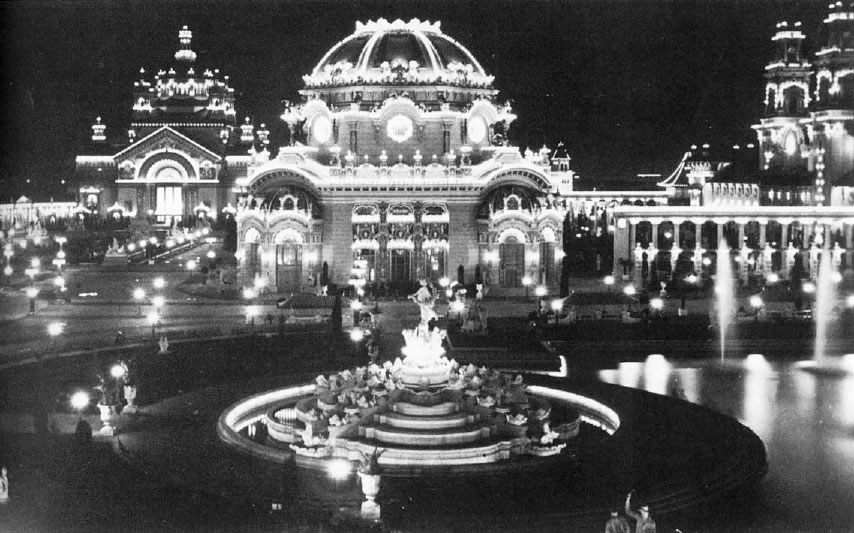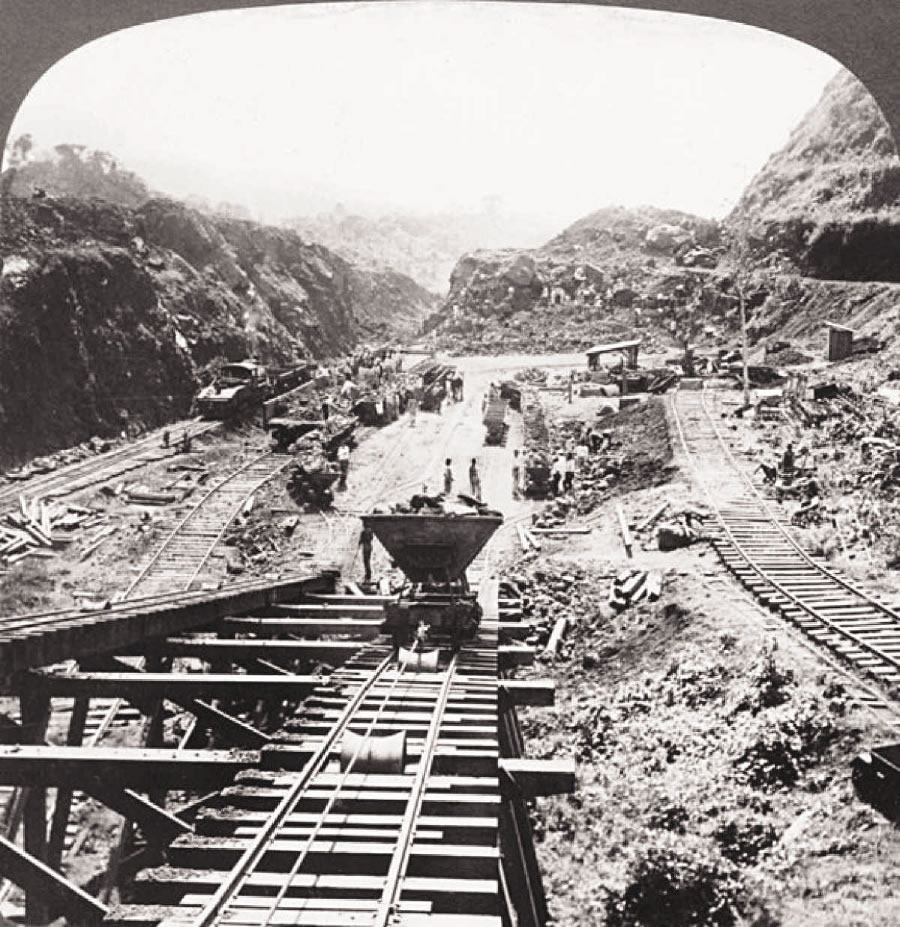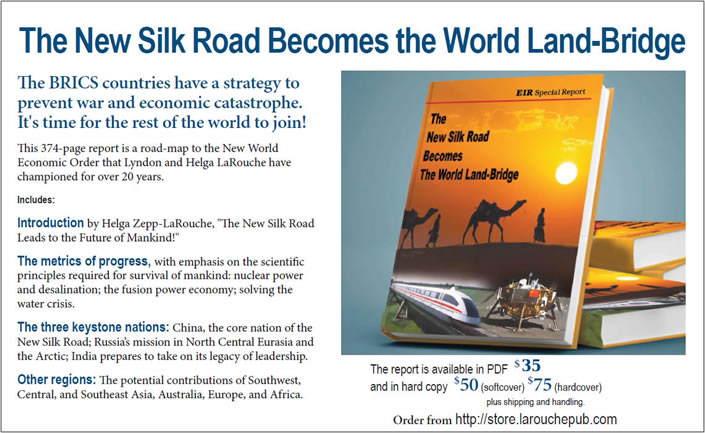The End of the Imperial Money System
by Robert Ingraham
September 2015
A PDF of this article, published in the October 2, 2015 issue of Executive Intelligence Review, is re-published here with permission.
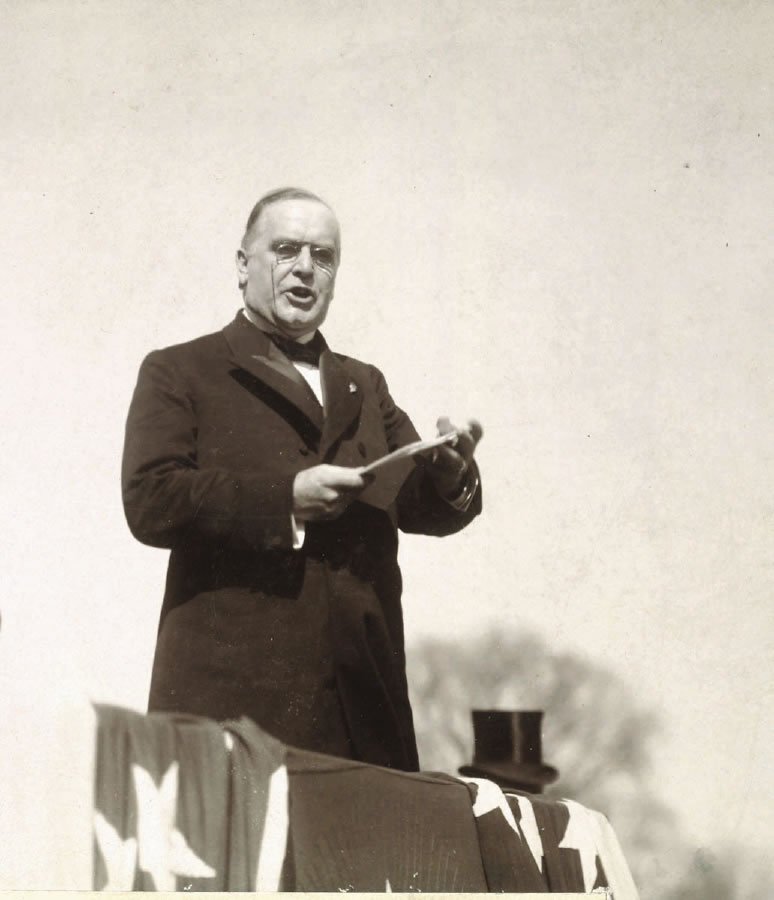
Library of Congress
President William McKinley gives his Inaugural Address on March 4, 1897. |
Sept. 26—Things were not always as they now are. The current fashionable axioms of the Twenty-First Century trans-Atlantic community, now blindly obeyed and unchallenged by the vast majority of that region’s population, are not in fact either self-evident truths or products of rigorous scientific investigation. The axioms and commonly held beliefs of today, which cover every aspect of human life from economics, to music and to science, are just that—unsupported, unexamined, and groundless “belief structures” which have been imposed on human culture beginning with the British empiricist onslaught, led by Bertrand Russell, at the beginning of the Twentieth Century.
For the United States, September 14, 1901 was the turning point. Prior to that fateful day, for forty years, the successive Presidencies of Abraham Lincoln, Ulysses Grant, and William McKinley, had succeeded in returning the American Republic to the original intent of the Washington Presidency, and that Administration’s philosophical outlook as embodied in the Constitutional Principle of Alexander Hamilton.
Throughout the history of American culture, there is a coherent philosophical and economic outlook which stretches from Lincoln through Grant to McKinley. On April 6, 1858, Abraham Lincoln delivered a lecture at Bloomington, Illinois titled “Discoveries and Inventions.” That lecture both encapsulates Lincoln’s views on economic policy as well as his insight into the creative identity of the human species, while at the same time the philosophical outlook of that lecture is fully coherent with the Principle of republican Human Development as identified by Alexander Hamilton in his Reports of 1790-1791. That Lincoln enunciation on human creativity and economic development—as policy intent—was carried forward by the Presidencies of Grant and McKinley and was only terminated by the bullet of a British-deployed assassin.
We are dealing with axioms of policy here, not reforms of existing structures within the currently accepted axioms. For example:
Current financial policies of the Federal Reserve and the U.S. Treasury have routinely been attacked from both the “left” and the “right.” The 2011 “Occupy Wall Street” phenomenon protested Wall Street “abuses” and the inequality of incomes and living standards within the United States. Similarly, on the “right,” after 2007, many “Tea Party” groups denounced the Wall Street “bailouts,” and of course, for the truly esoteric, there exists the John Birch/Eustace Mullins exposés of the Federal Reserve, Jekyll Island and the “Money Trust.” What all of these protests, whether from the left or right, have in common is that they merely focus on “abuses” of the financial system, or on who “controls” the financial system. Whether well-meaning or not, all of these protesters err by accepting the axiomatic existence of that Money System itself. But this Money System is not self-evident; nor has it existed forever, as a feature of human culture.
What we are discussing here is the CREATION of the Money System, an alien parasite brought into our nation after the murder of a U.S. President, and a system now accepted after more than 100 years as self-evident. That imperial monetarist system were better named the Bertrand Russell Monetary System, because its creation and its axioms all derive from the mathematical empiricism of Russell, and both the underlying axioms and the day-to-day practice of that system all deny—as Russell himself does—the actual creative nature of the human species.
I. Hamilton—and Human Economics
The philosophical content of Hamilton’s Principle has been identified and discussed at length by Lyndon LaRouche in many locations. The political and strategic nature of Hamilton’s efforts has been presented by this author in an earlier article published in the Executive Intelligence Review.1 For our present purposes it is enough to state that for Hamilton, the intention of the Constitutional Republic was to engender an ever-increasing increase in the productivity of the nation.
Hamiltonian CreditAmerican economist Lyndon LaRouche spelled out “Alexander Hamilton’s credit principle” succinctly in a Jan. 22, 2011 webcast: “Honest debt to the future can be paid only through honest creation of future physical and equivalent wealth, including the development of the relevant creative powers of the individual citizen, and also the children and adolescents of those families. “Such debts of a credit system must be paid by the fruitfulness of future production, as this principle was already understood by the Winthrops and Mathers of the original Massachusetts colony. Such debts require that the government delimit such accumulations of debt to the efficient commitment to promote that production. Such debt can be lawfully incurred only by a decision premised on a reasonable expectation of the relevant creation of the increased physical wealth, and of the increased physical productivity of the nation. Debts incurred on the account of financial speculation are not legitimate debts of a government. “This describes, in rather plain language, Alexander Hamilton’s great principle, as embedded in the subsuming intent of the Preamble of our Federal Constitution. Debts are good, when they are designed to be made good, as by a credit system based on a commitment to increase the creation of net wealth per capita, and per square kilometer of the territory of a nation.” |
This should not be understood from a mere accounting standpoint, i.e., as an increase in monetary profit margins for the nation’s enterprises, but rather a continuous increase in the productive power of the workforce, through a deliberate fostering of scientific, technological, and industrial revolutions which increase mankind’s “power over nature.” It should also be stressed that such an approach commits the nation to the fostering of not only an increase in living standards, but a deliberate policy of improving the cognitive and cultural abilities—power—of the nation’s citizenry. In essence, this is a future-oriented policy orientation, i.e., actual Value lies not in the dollar-denominated workings of the current market-place, but rather in the creation of a future, as-yet-unrealized, higher order of existence.
Much could be said about the specifics of Hamilton’s economic program, but it is the intent, as it flowed from both his understanding of the creative nature of the human species, as well as from the proper role of government in fostering such positive developments, which is the key to the matter.
In truth, economics, properly defined, has nothing to do with money. Economics is actually the study of people, or, more precisely, the study of the physical and cognitive progress of the human species. The use of Fire was discovered by mankind more than one million years ago. Pre-historic discoveries in the fields of astronomy, navigation, and metallurgy all dramatically helped to transform man’s relationship with the world around him and led to the expansion and uplifting of the species. This is Human Progress, something no beast is capable of, and it is made possible by creative human discoveries, not by money, nor by the mere buying and selling of goods as defined by Adam Smith.
Hamilton developed not a monetary system, but rather a sovereign national credit system through which the necessary physical economic development and the concomitant increase in the cognitive power of the citizenry could be supported and advanced, a development actually coherent with our species nature. That is the principle upon which the nation was created between 1787 and 1797. This is not mere assertion. A careful reading of, for example, Hamilton’s Report on Manufactures demonstrates that any contrary interpretation of the intent of the first Washington Administration is incompetent.
Economics is not value-less, nor amoral; it is grounded in the advancement of the species, the love of the species, the celebration of those qualities which separate us from the beasts. Only human beings are capable of conceptualizing current policy based on a future orientation, a future development of the power of the species. That truth is what Hamilton and his friends fought for, and that is what was lost in 1901.
II. From Lincoln to McKinley
On April 27, 1893 William McKinley delivered a eulogy for Ulysses S. Grant at Galena, Illinois on the seventy-first anniversary of Grant’s birth. Less than two years later, on February 12, 1895 McKinley delivered a eulogy in Albany, New York for Abraham Lincoln on the eighty-sixth anniversary of his birth.
The most striking thing about these two eulogies is the continuity of philosophical outlook. In the Eulogy for Lincoln, McKinley says:
The greatest names in American history are Washington and Lincoln. One is forever associated with the independence of the States and formation of the Federal Union; the other with universal freedom and the preservation of the Union. Washington enforced the Declaration of Independence as against England; Lincoln proclaimed its fulfillment not only to a downtrodden race in America, but to all people for all time who may seek the protection of our flag. These illustrious men achieved grander results for mankind within a single century, from 1775 to 1865, than any other men ever accomplished in all the years since first the flight of time began. . . .
The present generation knows Washington only from history, and by that alone can judge him. Lincoln we know by history also, but thousands are still living who participated in the great events in which he was leader and master. Many of his contemporaries survived him; some are here yet in almost every locality. So Lincoln is not far removed from us; he may be said to be still known to the millions—not surrounded by the mist of antiquity, nor a halo of idolatry that is impenetrable.
And in the Eulogy for Grant, he states:
With no disparagement to others, two names rise above all the rest in American history since George Washington—transcendently above them. They are Abraham Lincoln and Ulysses S. Grant. Each will be remembered for what he did and accomplished for his race and for mankind. Lincoln proclaimed liberty to four million slaves, and upon his act invited “the considerate judgment of mankind and the gracious favor of Almighty God.” He has received the warm approval of the one, and I am sure he is enjoying the generous benediction of the other.
His was the greatest, mightiest stroke of the war. Grand on its humanity side, masterly in its military aspect, it has given to his name an imperishable place among men. Grant gave irresistible power and efficacy to the Proclamation of Liberty. The iron shackles which Lincoln declared should be loosed from the limbs and souls of the black slaves, Grant with his matchless army melted and destroyed in the burning glories of the war; and the rebels read the inspired decree in the flashing guns of his artillery, and they knew what Lincoln had decreed Grant would execute . . . . Grant believed in the brotherhood of man—in the political equality of all men—he had secured that with his sword, and was prompt to recognize it in all places and everywhere. . . .
We are not a Nation of hero worshipers. We are a Nation of generous freemen. We bow in affectionate reverence and with most grateful hearts to these immortal names, Washington, Lincoln, and Grant, and will guard with sleepless vigilance their mighty work and cherish their memories evermore.
These two short eulogies provide the key to understanding McKinley the man, as well as the initiatives of his Presidency. For McKinley, the promise and the intent of the Washington, Lincoln, and Grant Presidencies represented a living vital commitment on his part to continue their work to further the principles of the American Revolution. Nothing about the McKinley Presidency can be understood unless one begins with that underlying truth.
Defending Black Equality
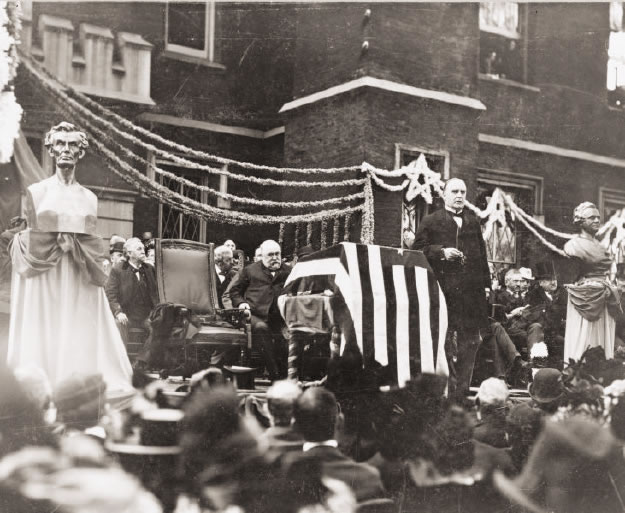 View full size President McKinley speaks at the 40th anniversary of the Lincoln-Douglas debate in Galesburg, Illinois, in October 1898. |
In the context of the brief overview provided in this article, there are two aspects to this personal commitment of McKinley’s worth discussing here.
The first of these, either rarely mentioned or down-played in most biographies of McKinley, was McKinley’s moral determination to continue the efforts of Lincoln and Grant on behalf of Black Americans in the South. By the 1890s this was a very difficult proposition. After the withdrawal of Federal troops from the South by President Hayes in 1877, the unrepentant forces of the Confederacy began to reassert control in state after state. In 1872 full amnesty was granted to almost all of the leaders of the former Confederate States of America and those white-supremacists subsequently returned to elected offices both in state governments and in the U.S. Congress itself. By 1877 all of the states in the South, except South Carolina, Florida, and Louisiana had reverted to white rule. In 1890 the arch-racist Benjamin Tillman responded to his election as Governor of South Carolina by saying, “The triumph of Democracy and white supremacy over mongrelism and anarchy is most complete.”
Also in 1890 the state of Mississippi repudiated its “Reconstruction Constitution,” one which guaranteed equal rights for blacks, and adopted a new constitution which removed blacks from elected office and denied them the right to vote. Almost every state in the South soon followed Mississippi’s example. Then, in 1896—the very year that McKinley was elected President—the Supreme Court handed down the Plessy v. Ferguson decision, effectively nullifying the intent of the Fourteenth and Fifteenth Amendments, and imposing on the entire nation the racial philosophy of the Southern Confederates.
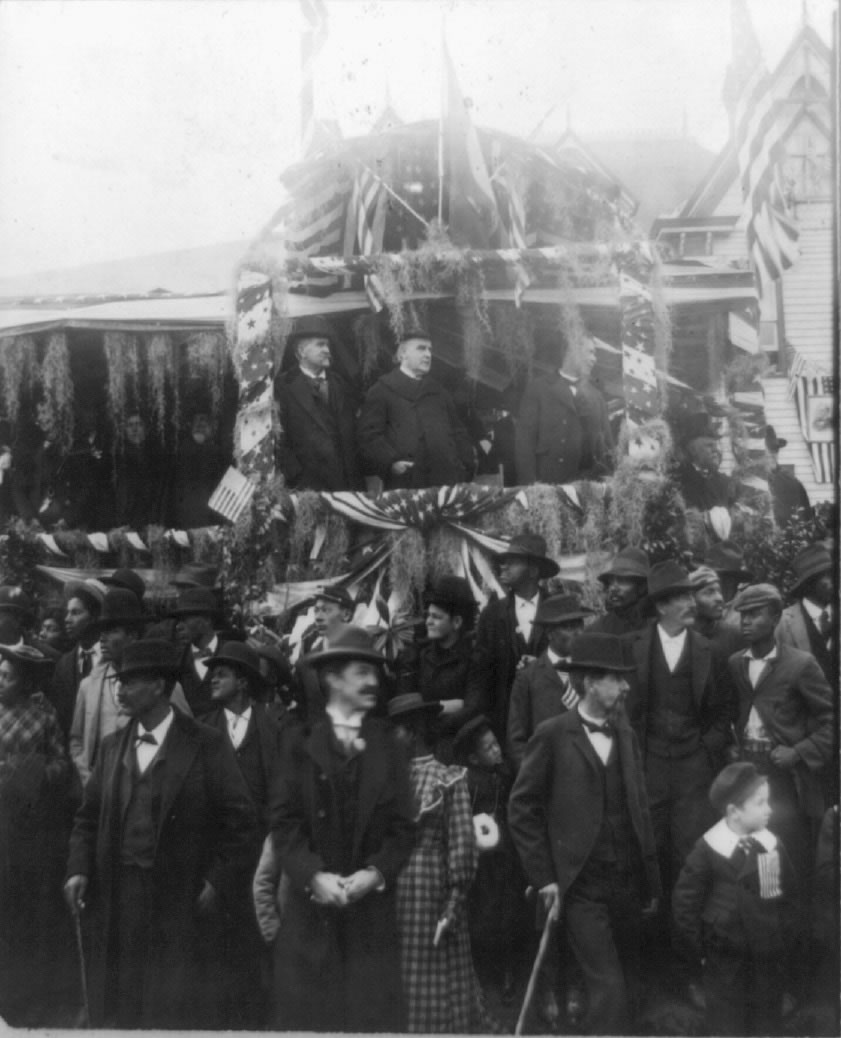 View full size Library of Congress
The crowd gathered outside William McKinley’s house during his 1896 “front porch” campaign for President, reflects his broad constituency. |
During those years a split developed within the Republican Party in the South, and two competing organizations emerged. These became known as the Black-and-Tan Republicans, an integrated alliance committed to a continuation of the Lincoln/Grant policy, including the policy of full voting rights for southern blacks, and the Lily-White Republicans, who acquiesced to Jim Crow rule, and who, by the 1880s, began purging black officials from their ranks.
Beginning with his years in Congress, and continuing through his Presidency, McKinley allied with the Black-and-Tans, and it was southern Black-and-Tan delegates who played a critical role in securing the Presidential nomination for McKinley at the 1896 Republican Convention.2 From 1877 through 1901 there was probably no other national figure in the Republican Party who fought harder against the resurgence of the Confederacy than McKinley. During his first term, McKinley did what he could to aid the former southern black Congressmen who had lost their positions as Jim Crow took control. These included Blanche Kelso Bruce, Robert Smalls, John Roy Lynch, Henry Plummer Cheatham, and Thomas Ezekiel Miller.
He also spoke out against Southern lynchings,3 supported the rights of the Black U.S. Army regiments (the “Buffalo Soldiers”), and used his power of federal appointment to secure non-elective positions, such as Postmasters, for many southern black Republicans.
Shortly after the Civil War, in 1867, McKinley had delivered his first-ever public speech. It was titled “On Black Equality.” An excerpt follows:
My friends and fellow-citizens, the settlements of that war—and I speak for my comrades of the Grand Army of the Republic—the settlements of that war must stand as the irreversible judgment of battle and the inflexible decree of a Nation of free men. They must not be misinterpreted, they must not be nullified, they must not be weakened or shorn of their force under any pretext whatsoever. . . . It must not be equality and justice in the written law only. It must be equality and justice in the law’s administration everywhere, and alike administered in every part of the Republic to every citizen thereof. It must not be the cold formality of constitutional enactment. It must be a living birthright. . . .
Our black allies must neither be forsaken nor deserted. I weigh my words. This is the great question not only of the present, but is the great question of the future; and this question will never be settled until it is settled upon principles of justice, recognizing the sanctity of the Constitution of the United States. We cherish no resentments from the war; we have no bitterness against the people of the South. We want them to be our brothers, not only in name but in spirit and heart. We bid them enjoy equally our prosperity. But at the same time we bid them obey the Constitution of the country. . . . Nothing can be permanently settled until the right of every citizen to participate equally in our State and National affairs is unalterably fixed. Tariff, finance, civil service, and all other political and party questions should remain open and unsettled until every citizen who has a constitutional right to share in the determination is free to enjoy it.
McKinley never wavered from that outlook. It should also be noted that, following the Civil War, in a legal career which lasted from 1867 to 1876, McKinley became famous for defending the rights of labor unions and working men. In one of his most celebrated cases, McKinley defended a group of coal miners arrested for rioting after a clash with strikebreakers. McKinley took the case pro bono (without pay) against the opposing group of mine owners. He was successful in obtaining acquittals for all but one of the defendants.
Grand Army of the Republic
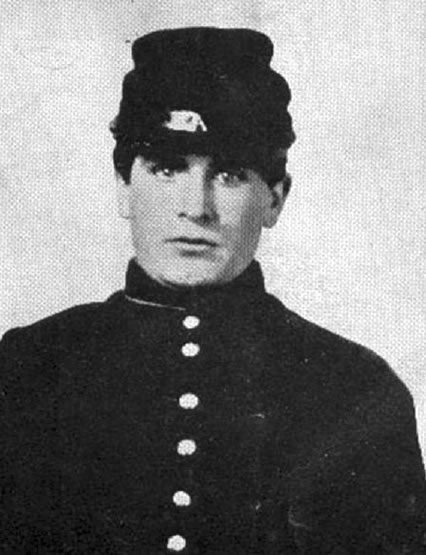
Brevet Major William McKinley during the Civil War. He was the last Civil War veteran to become President of the United States. |
William McKinley was the last Civil War veteran to serve in the White House. He had joined the 23rd Ohio Infantry in 1861, rising from Private to Major by the war’s end. During most of 1864 and 1865 the Ohio 23rd served under the overall command of General Philip Sheridan, during his campaigns in the Shenandoah Valley. It was this military service, and the mission of the Union Army, under the command of Ulysses Grant, which defines a second axiomatic feature of the entirety of McKinley’s later career. His continuing loyalty, his faithfulness, in honoring the mission and the sacrifices of the Union Army were afterwards always present in the motivations of his life’s mission.
As years passed, one of the critical conduits in linking his Civil War service and the Grant Presidency to his own later Presidency was McKinley’s relationship with the MacArthur family. Douglas MacArthur’s grandfather, Arthur MacArthur Sr., had been a close friend and ally of Ulysses Grant, and when Grant returned from his World Tour in 1879, he visited MacArthur and discussed with him the significance of, in particular, his meetings with the leaders of China and Japan. Four years later, in 1883, MacArthur’s son, Arthur MacArthur Jr., authored a paper titled “China Memorandum and Notes,” which his father presented to Ulysses Grant in a bid by Arthur to become America’s first military attaché to China. In that paper Arthur Jr. argued for an American commitment to defend the nations of east Asia against the designs of the British Empire.4
Later, after the Spanish-American War, Arthur MacArthur Jr. would not only be named Military Governor of the Philippines by President McKinley, but in 1905-1906 he would follow in the footsteps of Ulysses Grant with a tour of Asia that included visits to Japan, Shanghai, Hong Kong, Ceylon, a trip across India, Burma, Bangkok, Singapore, Rangoon, and Saigon. He was accompanied on this tour by his son Douglas MacArthur. Only five days before his assassination, McKinley met with Arthur MacArthur at McKinley’s home in Canton, Ohio. This McKinley/MacArthur discussion, of which there is no record, occurred precisely at the moment that McKinley was moving to put into place new policies and new relationships in both Asia and Latin America in opposition to the British Empire.
III. A Community of Republican Principle Among Nations
The primary identity that most amateur historians aver about William McKinley is that he was the “Champion of Protectionism.” However, labeling McKinley as simply a supporter of high protective tariffs, is not only extremely simplistic, but, more importantly, actually wrong as to McKinley’s motives and intent. McKinley was an anti-imperial peace-builder. It was neither narrow nationalism, nor simplistic “protectionism” which motivated his actions.
Beginning as early as his years in Congress, and becoming a central feature of his Presidency, McKinley increasingly put forward a policy then known by the name of “Reciprocity,” a policy also closely associated with Maine Republican leader and statesman James Blaine. Under McKinley this idea of Reciprocity became the guidepost for all of U.S. foreign policy, particularly toward the nations of Latin America. As the word implies, this was a policy of partnership among nations, particularly in the areas of mutually beneficial economic, scientific, and industrial development.
The day before his assassination, William McKinley delivered his final speech, one which contains his mature views which were intended to guide his second term as President. The speech was delivered at the Pan-American Exposition, in Buffalo, Sept. 5, 1901. Excerpts follow:
Expositions are the timekeepers of progress. They record the world’s advancement. They stimulate the energy, enterprise, and intellect of the people, and quicken human genius. They go into the home. They broaden and brighten the daily life of the people. They open mighty storehouses of information to the student. Every exposition, great or small, has helped to some onward step. . . .
The Pan-American Exposition has done its work thoroughly, presenting in its exhibits evidences of the highest skill and illustrating the progress of the human family in the western hemisphere. This portion of the earth has no cause for humiliation for the part it has performed in the march of civilization. It has not accomplished everything; far from it. It has simply done its best, and without vanity or boastfulness and recognizing the manifold achievements of others, it invites the friendly rivalry of all the powers in the peaceful pursuits of trade and commerce, and will co-operate with all in advancing the highest and best interests of humanity. . . .
The wisdom and energy of all the nations are none too great for the world’s work. The success of art, science, industry, and invention is an international asset and a common glory. After all, how near one to the other is every part of the world. Modern inventions have brought into close relation widely separated peoples, and made them better acquainted. Geographic and political divisions will continue to exist, but distances have been effaced.
The period of exclusiveness is past. The expansion of our trade and commerce is the pressing problem. Commercial wars are unprofitable. A policy of good will and friendly trade relations will prevent reprisals.
Reciprocity treaties are in harmony with the spirit of the times; measures of retaliation are not. If, perchance, some of our tariffs are no longer needed for revenue or to encourage and protect our industries at home, why should they not be employed to extend and promote our markets abroad? Then, too, we have inadequate steamship service. New lines of steamships have already been put in commission between the Pacific coast ports of the United States and those on the western coasts of Mexico and Central and South America. These should be followed up with direct steamship lines between the western coast of the United States and South American ports. One of the needs of the times is direct commercial lines from our vast fields of production to the fields of consumption that we have but barely touched.
View full sizeLibrary of CongressExcavation of the Panama Canal in 1907. This was one of the development projects for the Americas which President McKinley envisioned carrying out in cooperation with the nations of South America.We must build the Isthmian Canal, which will unite the two oceans and give a straight line of water communication with the western coasts of Central and South America and Mexico. The construction of a Pacific cable cannot be longer postponed. In the furtherance of these objects of national interest and concern you are performing an important part. This Exposition would have touched the heart of that American statesman whose mind was ever alert and thought ever constant for a larger commerce and a truer fraternity of the republics of the New World. His broad American spirit is felt and manifested here. He needs no identification to an assemblage of Americans anywhere, for the name of Blaine is inseparably associated with the Pan-American movement which finds here practical and substantial expression, and which we all hope will be firmly advanced by the Pan-American Congress that assembles this Autumn in the capital of Mexico.
The good work will go on. It cannot be stopped. These buildings will disappear, this creation of art and beauty and industry will perish from sight, but their influence will remain to “Make it live beyond its too short living with praises and thanksgiving.”
Gentlemen, let us ever remember that our interest is in concord, not conflict, and that our real eminence rests in the victories of peace, not those of war. We hope that all who are represented here may be moved to higher and nobler effort for their own and the world’s good, and that out of this city may come not only greater commerce and trade for us all, but, more essential than these, relations of mutual respect, confidence, and friendship, which will deepen and endure.
Our earnest prayer is that God will graciously vouchsafe prosperity, happiness, and peace to all our neighbors and like blessings to all the peoples and powers of earth.
Some Brief Remarks on Historical Background
Space constraints do not allow a full exposition of all of the events surrounding the McKinley Presidency. The following will have to suffice.
On the Spanish-American War: McKinley strongly opposed the Spanish-American War and did everything he could to prevent its outbreak, even after the destruction of the USS Maine. Once the war began, his overriding concern was that it not be turned into an imperial war.
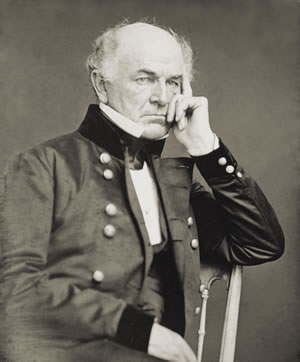
Library of Congress
McKinley’s ambassador to Russia, Gen. Ethan A. Hitchcock, was tasked with collaborating with the Russian government in great projects such as the trans-Siberian railroad. He served in 1897. |
McKinley recognized that the cause of the Cuban rebels was just, that the Cuban rebellion basically pitted former black slaves and native Indians against the atrocities of the colonial Spanish, and he was deliberate in his approach that we were aiding the natives of Cuba to free themselves from colonialism. As for the Philippines, although it was a more difficult situation than Cuba, once again, both McKinley and Arthur MacArthur viewed their mission as one of spreading republicanism and economic development into Asia. This view of justice for Asians also extended to McKinley’s intervention into the Chinese Boxer Rebellion, where he acted independent of the European powers to thwart British designs on China and to defend the sovereignty of that nation.
The McKinley Administration also cooperated with Russia on the development of the trans-Siberian Railroad, including by sending Ethan Allan Hitchcock as Ambassador to Russia where he worked closely with Count Sergei Witte on the project.
McKinley’s actions in the Philippines, China, and Russia were not individual initiatives. It is clear that by 1900 McKinley believed that the United States was powerful enough and possessed sufficient economic might—for the first time in its history—to step onto the world stage as a direct challenger to the hegemony of the British Empire. The policy of Reciprocity, for example, represented the vision of a new republican world order, a mortal danger to British imperialism. It is also clear that McKinley (as well as Arthur MacArthur) viewed east Asia as the primary battleground against the British.
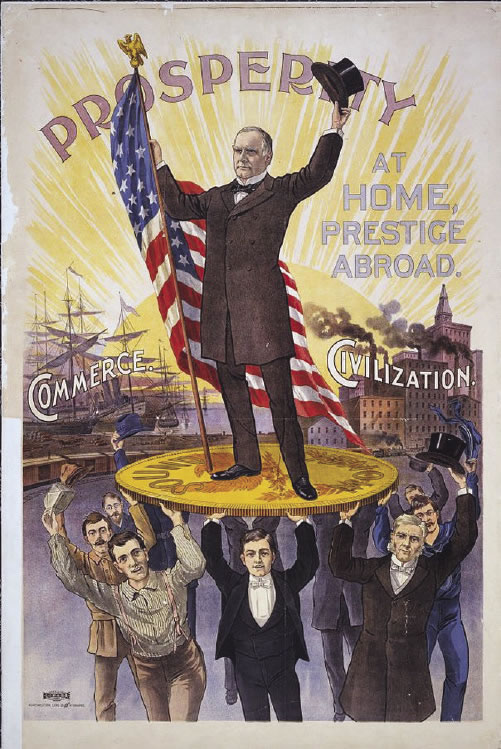 View full size Library of Congress
McKinley’s election poster reflects his campaign for the “general welfare” and international cooperation. |
McKinley is generally portrayed as a strong opponent of “soft money,” and it is true he battled the incompetent “silver crusade” of William Jennings Bryan, which would have saddled the United States with an artificial, wildly inflated currency. However, during his first term McKinley made strenuous efforts to recruit other nations into a “bimetallic,” i.e, silver and gold, global monetary standard. France and several other nations agreed to the convening of an international conference on bimetallism, but British sabotage prevented that conference from ever taking place.
It was also McKinley who led the nation back to economic recovery from the deep depression of 1892-1897. The banking Panic of 1893 was followed by the closure of more than 500 banks and by tens of thousands of business failures. National unemployment rose from 3 million in 1892 to 15 million in 1896. President Grover Cleveland unsuccessfully tried to stem the collapse with gold purchases from Wall Street and other financial manipulations, but it was the election of McKinley and his actions to stabilize trade and production which turned the tide. One action taken by McKinley was the expansion of the number of National Banks with small capital, to protect farmers and other western interests from credit starvation.
While serving in Congress, later as Governor of Ohio, and finally as President, McKinley stood forthright as a champion of the “General Welfare,” including as a defender of the rights and living standards of trade unions and working people. One example of this was his sponsorship of federal legislation mandating an eight-hour work day for all federal employees. The late Nineteenth Century was a period of continual social convulsions, largely arising from London-created “Panics” which repeatedly plunged the United States into economic crisis and mass unemployment. Violence, labor unrest, and strikes were the inevitable consequences of these crises. Throughout those years, McKinley repeatedly acted to defend working Americans, including during the famous “Debs Rebellion” (national railroad strike) of 1894.
1901—the Turning Point
On March 13, 1881, the great reformer and the defender of the United States from 1862 to 1865, the Czar of Russia Alexander II, was assassinated. Nine years later the pro-American German Chancellor Otto von Bismarck was removed from office in a political coup d’état. Both men had held extensive discussions with Ulysses Grant during his 1878-1879 World Tour, and both were in complete concord with the policy orientation of the Lincoln and Grant Presidencies. They were America’s two most important partners on the world stage.
Then, between 1894 and 1900, the President of France Sadi Carnot (1894), the Spanish Premier (1897), the Empress of Austria (1898), and the King of Italy (1900) were all assassinated, almost all of them by British-steered anarchists. This was all part of the British build-up toward World War I.
Then, on September 6, 1901, President William McKinley, the last Lincoln Republican to occupy the White House, was shot twice at the Pan-American Exposition in Buffalo, New York by Leon Czolgosz, a protégé of the Russian-American anarchist Emma Goldman.5 Eight days later McKinley died from his wounds.
Teddy Roosevelt, stepping into office over the bloody body of McKinley, then proceeded to reverse every one of McKinley’s policies. Reciprocity and friendship with foreign nations, and the promulgation of American republican ideals were replaced by the policy of the “Big Stick” and colonialism. Britain became our dearest ally. The westward Manifest Destiny of American development was halted as Roosevelt launched the modern environmentalist movement and proceeded to lock up western lands. The blacks of the South were utterly abandoned as Roosevelt allied himself with the Lily-Whites and turned a blind eye to lynchings and mass murder.
In 1908 Roosevelt established the Bureau of Investigation (BOI), the forerunner of today’s FBI. When Congress refused to allocate funds for what they charged was a nationwide “secret police,” Roosevelt instructed Attorney General Charles Bonaparte to establish the agency under Presidential authority.
Two years later, following the wrenching financial Panic of 1907,6 Roosevelt led the way in establishing the National Monetary Commission, a group charged with “reforming” America’s banking and financial system. It was the work of that Commission which led directly to the infamous 1910 Jekyll Island tryst, whose end product was the establishment of the U.S. Federal Reserve in 1913.
By 1915 the Lincoln-Grant-McKinley tradition was dead, America was de facto aligned with Britain, a money-centered power was in control of the nation’s economy; a supporter of the Ku Klux Klan was in the White House—and America was preparing to enter World War I.
IV. Bertrand Russell’s Monetarism
There is not a single university within the United States which today teaches economics, as economics as a physical science is defined by Gottfried Leibniz and Alexander Hamilton. The University graduates and the recipients of doctorates from Ivy League and related institutions have all actually been trained in Bertrand Russell-derived monetarism, not in economics.
This analysis of current-day monetarism was already accomplished twenty-four years ago in the basic textbook So, You Wish to Learn all about Economics7 by Lyndon LaRouche, particularly in Chapter Seven, “A Chapter Dispensing with Monetary Theory.” Therein, LaRouche states: “What passes for ‘economics’ in textbooks and professional journals today is essentially nothing more than monetary theory.” Without recapitulating that entire chapter here, suffice it to say that LaRouche traces the roots of current British monetary theory back to Thomas Hobbes, Francis Bacon, and John Locke, and successively to the two following generations of David Hume, Adam Smith, and Jeremy Bentham, and then Thomas Malthus, James Mill, John Stuart Mill, and David Ricardo. It was this latter Nineteenth Century grouping who, in turn, became the immediate predecessors to the imperial Bertrand Russell.
Real vs. Fictitious Mathematical Wealth
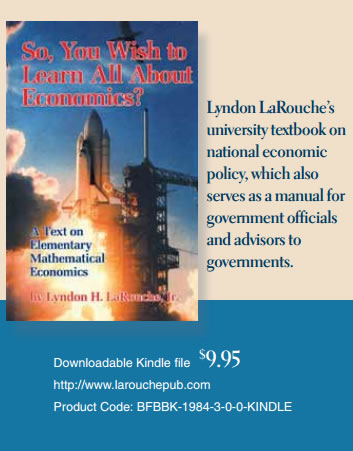 So, You Wish to Learn all About Economics, by Lyndon LaRouche, New Benjamin Franklin House, New York,1984, available at EIR’s website. |
The modern roots of today’s monetarist outlook and financial speculation can all be traced back to the practices of the Bank of Amsterdam and the Amsterdam Bourse in the Seventeenth Century. After the Dutch invasion of Britain in 1688, those practices—in their entirety—were brought into London.
By the time of the Nineteenth Century emergence of British Liberalism, we already find a mature anti-human monetarist outlook, one in which people become mere commodities, and where “wealth” is defined by monetary profits, not an advancement in the human condition.
The revolution in human affairs at the beginning of the Twentieth Century ushered in the creation of something even worse, a truly Satanic philosophy which destroyed not only economics, but poisoned virtually every aspect of our culture. Beginning with the work of David Hilbert and Bertrand Russell between 1900 and 1903, an attack was launched on the very nature of the human species itself. Hilbert and Russell argued that human creativity simply does not exist, and that all areas of science, economics, music, and every other field of human endeavor can be explained by dead mathematical formulas.8
It was the work of Hilbert and Russell which led directly into the Money System of the Twentieth Century, as well as virtually all of the modern schools of economics, which themselves are universally derived from the study of statistics, mathematical models, and probability theory. This approach pre-dates Russell, as, for example, with the publication in 1890 of the Principles of Economics by Alfred Marshall, whose work would have a profound influence on John Maynard Keynes. The so-called Austrian School also has its roots in the late Nineteenth Century, when it was actually created as a continental offshoot of the British School in order to do combat with the industrially-oriented Prussian School of Economics.
Nevertheless, after Bertrand Russell, the change was profound. Ludwig Von Mises published his Theory of Money and Credit in 1912, and John Maynard Keynes followed with his first book, A Theory on Probability, written in 1913 and published in 1921. This was a declaration of war against the human species. Economics was now defined as purely a mathematical construct of money. The Austrians and the Brits may have differed on approach and policy, but their axioms were (and still are) identical. Human creativity does not exist. Wealth is defined strictly in artificial monetary values. Probability theories and mathematical formulas will teach us how to maximize the extraction of profit from any system or market.
Completely absent is the Hamiltonian concept of human creativity and human progress. Completely absent is any consideration of the Human Mind. Completely absent is the reality of human invention, human discovery which has been the generator for all human advancement since the original mastery of the use of fire so many aeons ago.
This mathematical fantasy, and the financial looting it is designed to perpetuate, is what the Federal Reserve System in the United States was created to serve. The tragedy is, that after 100 years of the Russellite influence, both these speculative financial institutions, as well as the “culture of money” within which they operate, are now universally pervasive in the trans-Atlantic world. People simply no longer know how to think about actual human wealth. They are simply stupid. Far more stupid than their great-great-grandparents.
V. Today—a New Harmony
Fortunately, an opportunity now exists to throw off this 100-plus year Dark Age. But it will not be easy.
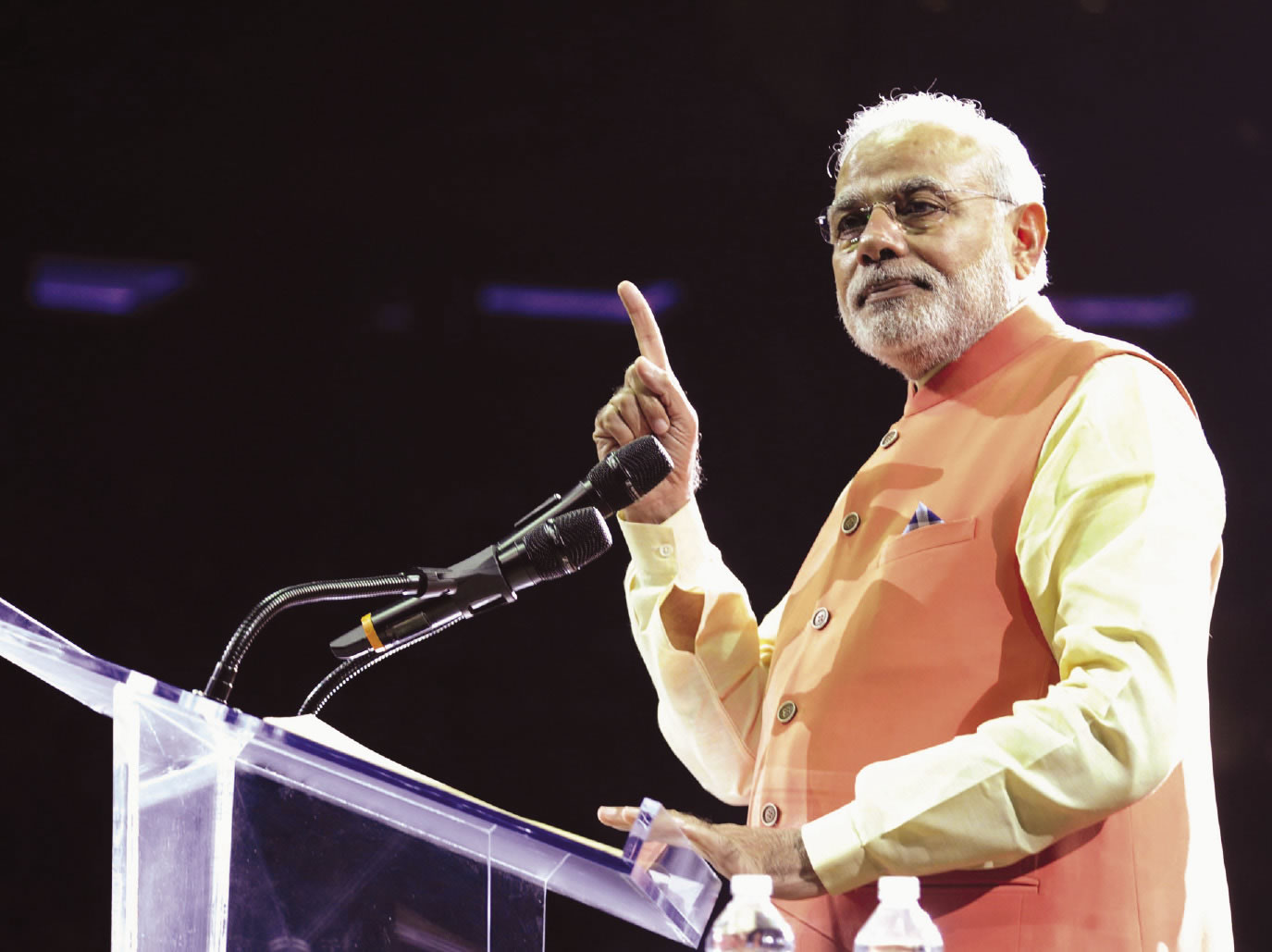
PiB India
Indian Prime Minister Narendra Modi reflected the anti-monetarist spirit of the BRICS, when he told the crowd gathered at Madison Square Garden on Sept. 28, 2014 that India’s 1.25 billion people were its wealth. |
On the positive side is the return not only to physical economics, but Hamiltonian science-driver economics, which has taken root in the development policies of the BRICS nations and the Shanghai Cooperation Organization. Nothing like this orientation has been seen in the world since the death of Franklin Roosevelt in 1945. Perhaps most exhilarating is the China-led Return to the Moon, a commitment to the human development of our Solar System, an expanding effort which now involves many nations—even some from among the poorest—from throughout the world. This is the path along which we as a species must proceed, and these initiatives are happening, now.
These efforts are the new Harmony, the modern reflection of the Lincoln-Grant-McKinley Reciprocity among nations, and it is within our reach to achieve it.
On the negative side, obviously there is the mental illness of the war-mongering President Obama, together with the blood-thirsty ambitions of the British Monarchy, which represent the most deadly threat to this new global orientation. But there is also the cultural obstacle. This has two aspects:
On the one hand, almost the entire population of Europe and North America, at least those under 80 years of age, have lived within a monetarist system their entire lives. They don’t know anything else, and the younger they are, the worse the mental disease is. Lyndon LaRouche has pointed to the destruction of the Clinton Presidency and the subsequent fifteen years of the Bush and Obama Administrations, as a point of absolute downturn in the mental abilities of the American population. In American culture today there is no future orientation, no recognition of that creative human spark which sets us apart from the beasts, and no understanding whatsoever of economics. This is what 100 years of Bertrand Russell have brought us to.
At the same time, there is a tendency even among more intelligent, more courageous leaders to view actions such as the re-enactment of Glass-Steagall as “financial reforms.” There is a reluctance, perhaps even among some of the BRICS leaders, to challenge the axioms of the Money System itself. What actually needs to be said is “We will not be slaves to imaginary mathematical formulas; we are human beings, and we will take the necessary physical and scientific steps to secure future human development.” It remains to be seen if people will act in that direction.
All money and all banks are creations of governments, creations of human beings. These institutions must be made to act in the interests of the human species. Failing that, they should either abolished or transformed by government action into something actually useful. They have no independent right to existence.
That is the fight. That is the challenge. It is no more difficult a challenge than that faced by Washington, or Lincoln, or Grant, which means it is a fight which can be won. And our hope of winning—as Friedrich Schiller understood the idea of hope—is much better today than it was yesterday.
This article was prepared with the assistance of Maureen McMichael and Dean Andromidas
Footnotes
2. Conversely, in both 1904 and 1912 it would be the Lily-White Republicans who would mobilize on behalf of Teddy Roosevelt.
3. By the 1890s there were over 200 lynchings per year in the South.
4. Arthur MacArthur Jr., as is well-known, was also the 18 year-old hero of the 1863 Battle of Missionary Ridge, where troops under the command of Ulysses Grant, William Tecumseh Sherman and Philip Sheridan broke the back of the Confederate Army of Tennessee.
5. Czolgosz had met with Goldman, an advocate of political assassination, at her home in Cleveland in June 1901, and, during Czolgosz’s subsequent trial, Goldman authored an article titled “The Tragedy at Buffalo,” wherein she defended Czolgosz’s killing of McKinley and compared it to the assassination of Julius Caesar by Marcus Junius Brutus.
6. Between 1880 and the first World War, the United States was battered by a continuous series of London-created financial crises, including the Panics of 1884, 1893, and 1907. All of these Panics were brought about by severe credit contractions emanating from the Bank of England. During this time-frame British new capital issues accounted for 75% of all foreign investment in United States. Leading into the 1893 Panic, for example, new capital issues by the Bank of England went from £142.6 million in 1890 to 81.1 million in 1892, and 49.1 million in 1893. Investment collapsed, financial obligations could not be met, and businesses folded by the thousands. Between 1885 and 1888, there were 51,748 business failures, with liabilities of $757 million. In the 1907 Panic, another London-imposed policy of contraction and interest-rate hikes drained specie out of American markets. All of these crises were then used by Wall Street to justify their demands for monetary “reform,” leading into the creation of the Federal Reserve.
7. So, You Wish to Learn all About Economics, by Lyndon LaRouche, New Benjamin Franklin House, New York,1984, available at EIR’s website.
8. See Hilbert and Russell: The Suffocation of Science by Mathematics, by Phil Rubinstein, Executive Intelligence Review, June 12, 2015, available here.


